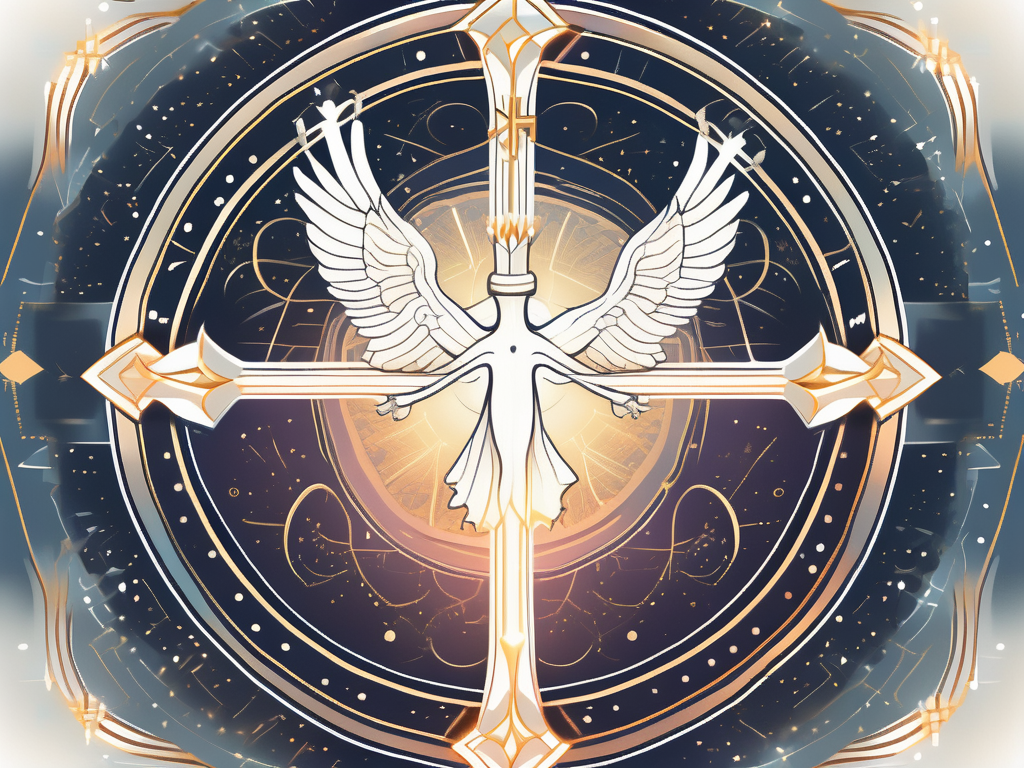In Christianity, the concept of the deity of Christ is of utmost importance. It is the belief that Jesus Christ is not just an ordinary human being, but rather the embodiment of God Himself. This article seeks to delve into the various aspects and implications of this profound theological concept.
Understanding the Concept of Deity in Christianity
When discussing the deity of Christ, it is essential to first understand the theological perspectives on deity within Christianity. Different branches of Christianity may have slightly different viewpoints, but the core belief remains the same – that Christ is divine. Some view Christ as the second person of the Holy Trinity, while others see Him as the incarnation of God on earth.
The role of deity in Christian faith is pivotal. Believers consider it crucial because it is through the deity of Christ that they can attain salvation and a personal relationship with God.
Christianity, as a religion, places great emphasis on the concept of deity. The belief in a divine being is central to the faith, and understanding the nature of this deity is of utmost importance. In the case of Christianity, the deity is often associated with the figure of Jesus Christ.
Within Christianity, there are various theological perspectives on the deity of Christ. One common viewpoint is that Christ is the second person of the Holy Trinity, alongside God the Father and the Holy Spirit. This perspective sees Christ as an integral part of the Godhead, sharing in the divine nature and essence. According to this belief, Christ is not merely a human being but a divine being as well.
Another perspective within Christianity is that Christ is the incarnation of God on earth. This viewpoint emphasizes the idea that God took on human form in the person of Jesus Christ. It sees Christ as both fully human and fully divine, a unique union of the divine and the human. This understanding of Christ’s deity highlights the belief that God, in His infinite love and mercy, chose to enter into the human experience to bring salvation and redemption to humanity.
Regardless of the specific theological perspective, the concept of deity in Christianity holds great significance for believers. It is through the deity of Christ that Christians believe they can attain salvation and establish a personal relationship with God. The belief in Christ’s divinity is seen as the foundation of the Christian faith, providing hope, guidance, and a sense of purpose to believers.
Furthermore, the deity of Christ is often seen as a source of comfort and reassurance for Christians. In times of difficulty or uncertainty, the belief in a divine and loving Savior can bring solace and strength. The deity of Christ represents the embodiment of God’s love and grace, offering forgiveness and redemption to all who seek it.
In conclusion, the concept of deity in Christianity is a central and foundational belief within the faith. Whether viewed as the second person of the Holy Trinity or the incarnation of God on earth, the deity of Christ holds immense importance for believers. It is through this belief that Christians find salvation, establish a personal relationship with God, and find comfort in times of need. The understanding of Christ’s divinity is a cornerstone of the Christian faith, providing believers with hope, purpose, and a profound sense of God’s love and presence in their lives.
The Biblical Basis for Christ’s Deity
The affirmation of Christ’s deity finds its roots in both the Old and New Testaments. The Old Testament contains numerous prophecies that foretell the coming of the Messiah, who would embody God’s divine nature. These prophecies, such as Isaiah’s prediction of a virgin birth, point to Christ’s unique nature.
The prophecy of Isaiah, found in Isaiah 7:14, speaks of a virgin who will conceive and bear a son. This miraculous birth is a clear indication of the divine nature of the Messiah. It is a fulfillment of God’s promise to send a Savior who would bring salvation to humanity. This prophecy sets the stage for the revelation of Christ’s deity.
Furthermore, the book of Micah prophesies the birthplace of the Messiah. In Micah 5:2, it is written, “But you, Bethlehem Ephrathah, though you are small among the clans of Judah, out of you will come for me one who will be ruler over Israel, whose origins are from of old, from ancient times.” This prophecy not only reveals the birthplace of the Messiah but also emphasizes His eternal nature. It signifies that the Messiah is not merely a human being but has existed from ancient times, pointing to His divine origin.
The New Testament further affirms the deity of Christ. Gospel accounts recount His miraculous birth, divine wisdom, and supernatural powers. His followers witnessed His authority over demons, ability to calm storms, and power to heal the sick. These accounts serve as strong evidence for Christ’s divine nature.
One of the most significant events that demonstrate Christ’s deity is the Transfiguration. In Matthew 17:1-8, Jesus takes Peter, James, and John up a high mountain, where He is transfigured before them. His face shines like the sun, and His clothes become as white as light. Moses and Elijah appear, talking with Him. This extraordinary event reveals Christ’s divine glory and His connection to the Old Testament prophets. It confirms His authority and divine nature.
Additionally, Jesus’ resurrection from the dead is a powerful testimony to His deity. After His crucifixion, Jesus conquered death and rose again on the third day, just as He had foretold. This miraculous event not only validates His claims of being the Son of God but also demonstrates His power over life and death. It is a pivotal moment in human history that solidifies the belief in Christ’s divine nature.
Furthermore, Jesus’ post-resurrection appearances to His disciples provide further evidence of His deity. He appeared to them multiple times, demonstrating His physical presence and offering proof of His resurrection. These encounters solidify the belief in Christ’s divine nature and affirm His victory over death.
Christ’s Self-Identification as God
Jesus consistently claimed to be divine throughout His earthly ministry. He referred to Himself as the “Son of God” and the “Son of Man.” These titles not only emphasized His divinity but also His unity with humanity.
When Jesus called Himself the “Son of God,” He was making a profound statement about His nature and relationship with God the Father. In Jewish culture, the term “Son of God” carried a significant meaning. It denoted a close and unique relationship with God, indicating a divine identity. By using this title, Jesus was asserting His divine nature and claiming to be equal with God.
Similarly, Jesus referred to Himself as the “Son of Man.” This title, derived from the book of Daniel in the Old Testament, had messianic implications. It signified Jesus’ role as the long-awaited Messiah who would establish God’s kingdom on earth. But it also highlighted His humanity, as the term “Son of Man” emphasized His identification with the human race. In claiming to be the “Son of Man,” Jesus was affirming His divinity while also embracing His role as the Savior of humanity.
Moreover, Jesus performed miracles that pointed to His divine nature. The Gospels are filled with accounts of Jesus healing the blind, restoring sight to those who had never seen the world around them. These miraculous acts not only brought physical healing but also revealed Jesus’ authority over creation. By giving sight to the blind, Jesus demonstrated His power to bring light into the darkness and to restore wholeness to broken lives.
In addition to healing the blind, Jesus made the lame walk. He restored mobility to those who were unable to walk, giving them a new lease on life. These miracles showcased His divine authority over physical limitations and His ability to bring transformation and restoration to those in need.
But perhaps the most astonishing of Jesus’ miracles was His ability to raise the dead. On multiple occasions, Jesus brought people back to life, defying the natural order of things. These extraordinary acts of resurrection not only displayed His power over death but also affirmed His deity. By conquering death, Jesus revealed Himself as the source of life and the ultimate authority over all creation.
Through His self-identification as the “Son of God” and the “Son of Man,” as well as His miraculous deeds, Jesus consistently affirmed His divine nature. His words and actions left no doubt that He was not merely a great teacher or prophet, but the very Son of God who had come to reconcile humanity with their Creator.
Theological Implications of Christ’s Deity
The belief in Christ’s deity has significant implications for Christian doctrine. It shapes the understanding of God’s nature and His role in human salvation. The understanding of Christ as both fully divine and fully human helps believers comprehend the depth of God’s love and sacrifice.
When we delve into the theological implications of Christ’s deity, we begin to grasp the profound mysteries that lie at the heart of Christianity. The concept of Christ’s divinity goes beyond a mere acknowledgment of His supernatural nature; it encompasses the very essence of God’s character and His relationship with humanity.
One of the key aspects of Christ’s deity is the revelation it provides about God’s nature. Through Christ, we come to understand that God is not a distant and detached being, but rather a compassionate and loving Father who willingly entered into human existence. The incarnation of Christ demonstrates God’s desire to intimately connect with His creation, to experience our joys and sorrows, and to ultimately offer us salvation.
Moreover, the belief in Christ’s deity sheds light on the nature of salvation itself. It is through His divine nature that believers find redemption and forgiveness of sins. The sacrifice of Christ on the cross becomes the ultimate act of love and atonement, bridging the gap between humanity and God. In this act, we witness the profound depths of God’s mercy and grace, as He offers us a way to be reconciled with Him.
As we contemplate the theological implications of Christ’s deity, we are confronted with the magnitude of God’s love for humanity. It is a love that surpasses our understanding, a love that led Him to take on human form and endure the ultimate sacrifice. Through Christ’s deity, we find hope, purpose, and the assurance of eternal life.
Furthermore, the belief in Christ’s deity has far-reaching implications for our daily lives as Christians. It calls us to imitate Christ’s example of selflessness, humility, and sacrificial love. It challenges us to live in a way that reflects the divine nature within us, striving to be vessels of God’s grace and instruments of His peace.
In conclusion, the theological implications of Christ’s deity are profound and transformative. They shape our understanding of God’s nature, reveal the depths of His love, and provide the foundation for our salvation. As we embrace and explore these implications, we are invited into a deeper relationship with God, a relationship that is marked by awe, gratitude, and a desire to live in accordance with His divine will.
Controversies and Debates Surrounding Christ’s Deity
Throughout history, the concept of Christ’s deity has sparked debates and disputes. In the early centuries of Christianity, various heresies challenged the orthodox belief in Christ’s divinity. For example, Arianism denied His full deity, considering Him a created being.
In the fourth century, the Council of Nicaea was convened to address the Arian controversy. This ecumenical council affirmed the orthodox belief in Christ’s full deity, declaring that He is “of one substance with the Father.” This declaration, known as the Nicene Creed, became a foundational statement of faith for Christians around the world.
However, the debates did not end there. In the following centuries, other controversies emerged, such as the Nestorian and Monophysite controversies. These debates centered around the nature of Christ’s personhood and the relationship between His divine and human natures.
The Nestorian controversy, which arose in the fifth century, focused on the question of whether Christ’s divine and human natures were united in one person or if they remained separate. Nestorius, the Archbishop of Constantinople, argued for a distinction between the two natures, leading to the belief that Mary should be called the “Christotokos” (Mother of Christ) rather than the “Theotokos” (Mother of God). This controversy was eventually condemned as heresy by the Council of Ephesus in 431.
The Monophysite controversy, which emerged in the same century, centered around the belief that Christ’s divine nature completely absorbed His human nature, resulting in a single nature. This view, championed by Eutyches, was condemned as heresy by the Council of Chalcedon in 451, which affirmed the orthodox belief in Christ’s two natures, fully divine and fully human, united in one person.
In modern times, interpretations and challenges continue to arise. Some scholars propose alternative understandings of Christ’s nature, attempting to reconcile the concept of deity with more rationalistic or philosophical frameworks. These debates often delve into complex theological and philosophical discussions, exploring the intricacies of the hypostatic union and the relationship between the divine and human in Christ.
One such modern controversy is the debate surrounding the kenotic theory of the incarnation. This theory suggests that Christ voluntarily emptied Himself of certain divine attributes during His earthly life, such as omniscience and omnipotence, in order to fully experience humanity. Proponents of this theory argue that it provides a more coherent explanation for the limitations and suffering Jesus experienced during His time on earth.
However, critics of the kenotic theory raise concerns about its implications for the doctrine of Christ’s deity. They argue that if Christ willingly gave up certain divine attributes, it undermines His full divinity and raises questions about the consistency of God’s nature.
In conclusion, the deity of Christ is a central tenet of Christian faith, emphasizing His unique nature as both fully human and fully divine. The biblical basis, Christ’s self-identification as God, and the theological implications all contribute to a comprehensive understanding of this profound doctrine. While debates and challenges may persist, the belief in Christ’s deity remains a cornerstone of Christian theology.












